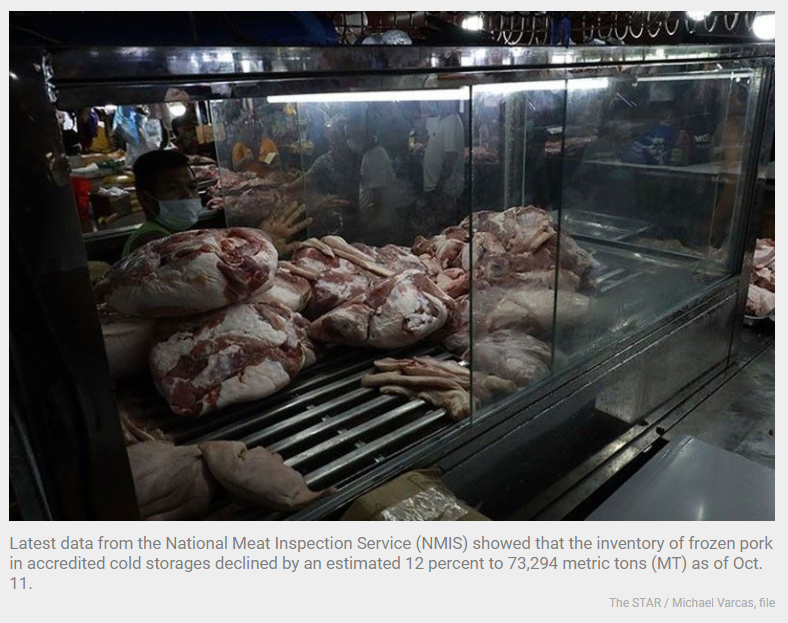Philippines: Imports continue to boost frozen pork inventory
MANILA, Philippines — The country’s inventory of frozen pork slightly dropped in the second week of October but the volume remains significantly higher than the previous year due to the influx of imports.
Latest data from the National Meat Inspection Service (NMIS) showed that the inventory of frozen pork in accredited cold storages declined by an estimated 12 percent to 73,294 metric tons (MT) as of Oct. 11.
The figure, however, is 65.8 percent higher than the 45,766 MT frozen pork inventory in the same period last year.
NMIS data showed that imported pork accounted for the bulk of the inventory at 71,528 MT, while local pork only had a 1,766.3 MT share.
The Calabarzon region registered the largest volume of imported pork during the period at 22,729.9 MT. It also had the largest share of local frozen pork at 880.57 MT.
The National Capital Region (NCR) also accounted for the bulk of the imported frozen pork at 22,222 MT.
Central Luzon and Central Visayas also had a sizable share of the imported frozen pork at 15,018 MT and 10,755 MT, respectively.
As part of the government’s effort to bring down prices and stabilize the supply of pork in the country, President Duterte issued Executive Order 133, which increased the MAV for pork meat to 254,210 MT for 2021.
Duterte also signed EO 134, which provides that in-quota pork imports or those under the MAV are imposed a 10 percent tariff for three months and increased to 15 percent in the remaining months. This is lower than the original rate of 30 percent.
Out quota pork imports are slapped with a 20 percent tariff for the first three months, which will be raised to 25 percent in the remaining months. This is lower than the original tariff of 40 percent.
Hog raiser groups earlier shared that the continued arrival of imported pork in the Visayas and Mindanao region is leading to a continued drop in farmgate prices of hogs.
Pork Producers Federation of the Philippines Inc. president Rolando Tambago said the farmgate price of hogs is already down by an average of P45 to P120 per kilo.
In the Visayas and Mindanao, farmgate prices likewise dropped by at least P40, accordng to National Federation of Hog Farmers Inc. president Chester Warren Tan.
“The intention of the government to increase MAV (minimum access Volume) or in-quota volume is to fill in the gap of supply for ASF (African Swine Fever) affected areas only, but data shows that even areas not affected by ASF like majority of Vismin, there is so much arrivals of imported pork causing downward trend on farmgate prices,”Tambago said.
He said that while hog raisers also understand the government’s intention to make pork affordable for majority of consumers, the government should also understand that hog farmers’ cost of production is also increasing.
“Government policy of addressing inflation rate should be balanced not only on retail price of pork meat but they must also take a conscious effort on how we can reduce cost of production,”he said.
Tambago said the average cost to produce is currently at P168 per kilo across the country.
Data from the Bureau of Animal Industry (BAI) showed that pork imports reached 439.3 million kilos from January to September, already 72 percent higher than the imports made for the whole of 2020.
The nine-month figure is also 261 percent higher than the 168 million kilos imported during the nine-month period.
On a monthly basis, pork imports totaled nearly 50 million kilos in September, lower than the 56.3 million kilos imported in August.
Spain was the country’s largest source of pork imports during the nine-month period with shipments totaling 104.5 million kilos or 24 percent of the total. It was followed by Canada (91.9 million kilos) and the United States (57.9 million kilos).
For this year, the Philippines is expected to import 500,000 metric tons of pork, according to the United States Department of Agriculture.
Source: https://www.philstar.com/business/2021/10/21/2135639/imports-continue-boost-frozen-pork-inventory


 Thailand
Thailand




